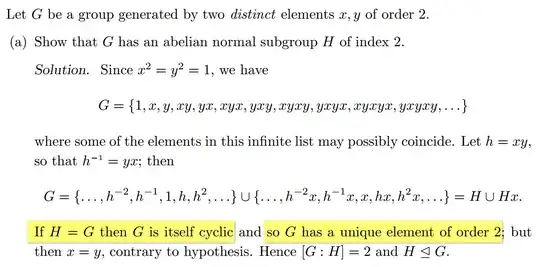I met some problem during googling.
The problem and its solution are next.
and I'm wondering about 2nd YELLOW BOX
$$ $$

$$ $$ Why does $G$ have a unique element of order $2$ in case of $H=G$ ?
$$ $$
The next is "my opinion" for 2nd YELLOW BOX...
If $H=G=H \cup Hx$ , then $Hx=H$
So, $x=h^k$ for some $k \in Z-\{0\} $.
By hypothesis for $|x|=2$ , I get $|h^k|=2$.
Therefore $G=\{1, h, h^2, \cdots , h^k , ... , h^{2k-1} \}$, and $G$ has an unique element $h^k$ of order $2$.
Is my opinion RIGHT?
I thought and thought AND THOUGHT so many time for digesting YELLOW BOX.. :-(
By any chance... Is it trivial thing?
OR Do you have any good idea for understanding YELLOW BOX?
Could you give me some advice, please?
Thanks for reading my question.